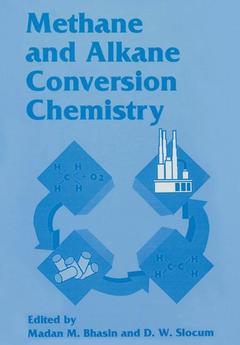Methane and Alkane Conversion Chemistry, Softcover reprint of the original 1st ed. 1995
Langue : Anglais
Coordonnateurs : Bhasin M.M., Slocum D.W.

Natural gas, an abundant natural energy and chemical resource, is underutilized. Its inherent high energy content is compromised by its volatility. Storage and transportation problems abound for liquified natural gas. Several of the drawbacks of the utilization of natural gas, particularly its high volatility, could be offset by development of an economical and efficient process for coupling and/or further homologation of its principal component, methane. Alternatively, other conversion strategies such as partial oxidation to methanol and syngas, to oxygenates or conversion to such products via the intermediacy of chlorides should also be considered. Given the energy-intensive regimes necessary for the likely activation of methane, it was inevitable that researchers would tum to the use of heterogeneous catalysts. Heterogeneous catalysis is now a relatively mature discipline with numerous and diverse reactions being explored alongside informative studies on surface characterization, mechanism, and theory. Relationships to important related areas such as homogeneous catalysis, organometallic chemistry, and inorganic chemistry have become firmly established within this discipline. The field of methane and alkane activation is now over ten years old. The first decade of investigation produced results plagued by low yields and low-moderate conversions with well-articulated mechanistic limitations. As we begin the second decade of inquiry, novel strategies have brought increasing yields and conversions to such products as ethane, ethylene, methanol, and formaldehyde. These new approaches utilize separation of products via membranes or adsorbents. Moreover, additional mechanistic insight has been forthcoming from theoretical and computational examination as well as experimental investigation.
Gas Conversion: Methane and Alkane Activation Chemistry.- Oxidative Coupling of Methane—A Progress Report.- Methane and Light Alkane (C2–C4) Conversion over Metal Fluoride-Metal Oxide Catalyst System in Presence of Oxygen.- Oxidative Coupling of Methane over Sulfated SrO/La.- The Oxidative Coupling of Methane over ZrO.- >Evidence for the Production of Methyl Radicals on the Na2WO4/SiO2 Catalyst upon Interaction with Methane.- >Two-Step, Oxygen-Free Route to Higher Hydrocarbons from Methane over Ruthenium Catalysts.- Homologation Reactions of Alkanes on Transition-Metal Surfaces.- A Comparative Study of Catalytic Behaviours of Sr-Ti, Sr-Zr, Sr-Sn Perovskites and Corresponding Layered Perovskites for the Oxidative Coupling of Methane.- Promotion by Dichloromethane of the Oxidative Coupling of Methane on LiMn/MgO Catalysts.- Kinetics of Reaction of Oxygen with Lithium Nickel Oxide, and the Role of Surface Oxygen in Oxidative Coupling of Methane.- Conversion of Methane to Higher Hydrocarbons over Supported Transition Metal Oxide Catalysts.- Mechanism and Modeling of Methane-Rich Oxidation.- Effect of Diffusion Limitations of Surface Produced Radicals on the C2 Selectivity in the Oxidative Coupling of Methane.- Effects of Product Separation on the Kinetics and Selectivity of Oxidative Coupling.- >Reactive vs. Adsorbed Oxygen in the Heterogeneous Oxidation of Methane over Li/MgO.- The Role of Free Methyl Radicals in the Selective Oxidation of Methane over Silica-Supported Molybdena.- Transient Studies of Methane Oxidative Coupling over Li Promoted LaNiO3 Catalysts.- Synthesis of C2+ Hydrocarbons and Syngas by Gas Phase Methane Oxidation under Pressure.- Infrared Spectroscopic Studies of Adsorbed Methane on Oxide Surfaces at Low Temperatures.- Computer-Aided Elucidation ofReaction Mechanisms: Partial Oxidation of Methane.- Methane to Oxygenates and Chemicals.- Selective Photo-Oxidation of Methane to Formaldehyde Using Supported Group VB and VIB Metal Oxide Catalysts.- A Study of the Iron/Sodalite Catalyst for the Partial Oxidation of Methane to Methanol.- Partial Oxidation of Methane to Formaldehyde over Vanadia Catalysts: Reaction Mechanism.- Comparison of the Conversion of Methane and Ethane on Metal-Oxygen Cluster Compounds.- Partial Oxidation of Methane by Molecular Oxygen over Supported V2O5 Catalysts: A Catalytic and in Situ Raman Spectroscopy Study.- Partial Oxidation and Cracking of Alkanes over Noble Metal Coated Monoliths.- Structural Features of Silica-Supported Vanadia Catalysts and Their Relevance in the Selective Oxidation of Methane to Formaldehyde.- Methane Conversion in AC Electric Discharges at Ambient Conditions.- Catalytic Studies of Methane Partial Oxidation.- Some Characteristics of the Partial Oxidation of CH4 to CH3OH at High Pressures.- Some Features of High Pressure Methane Oxidation to Methanol and Formaldehyde.- Strategies in Methane Conversion.- Direct Oxidation of Methane with Organometallic Reactions.- Coupling of Catalytic Partial Oxidation and Steam Reforming of Methane to Syngas.- Acetaldehyde from Chloromethane and Carbon Monoxide.- Para-Selective Gas Phase O2 Oxidation of Xylenes over Fe/Mo/Borosilicate Molecular Sieve, CVD Fe/Mo/DBH.- Methanol Oxidation over Oxide Catalysts.
Date de parution : 10-2012
Ouvrage de 349 p.
17x24.4 cm
Thèmes de Methane and Alkane Conversion Chemistry :
Mots-clés :
Chlor; catalysis; chemistry; inorganic chemistry; methanol; organic chemistry
© 2024 LAVOISIER S.A.S.
